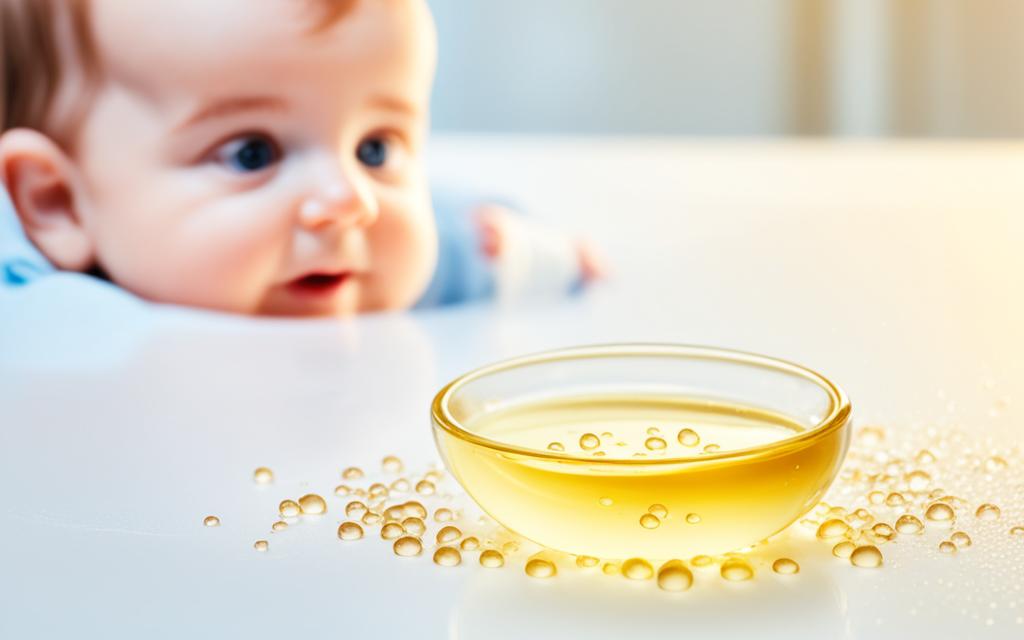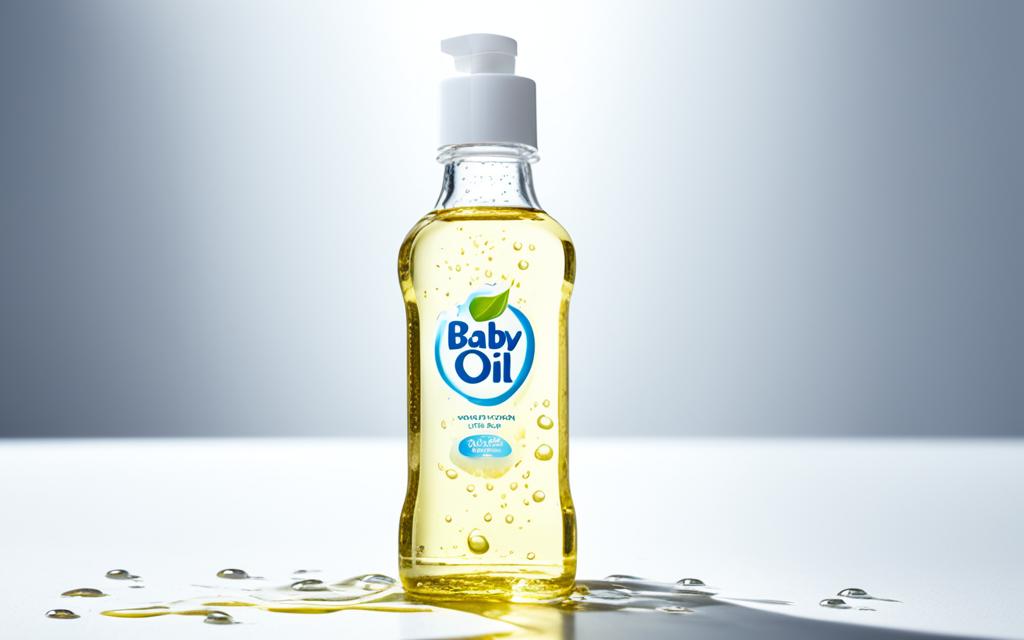When it comes to intimate moments, finding the right lubricant is crucial for both comfort and pleasure. Many people wonder if baby oil, a common household product, can be used as a sexual lubricant. In this article, we will explore the safety and risks associated with using baby oil as lube and provide essential facts to help you make an informed decision.
Key Takeaways:
- Baby oil is not recommended as a personal lubricant due to potential risks and side effects.
- Using baby oil as lube can lead to irritation, allergic reactions, and other adverse effects.
- There are various alternatives to baby oil that are specifically designed for intimate use and offer better safety and effectiveness.
- When selecting a lubricant, consider factors such as pH balance, compatibility with contraceptives, and personal preferences.
- Consulting with experts in the field of sexual health can provide valuable insights and recommendations for safe and pleasurable lubrication.
Understanding Personal Lubricants
Before we explore whether baby oil can be used as a personal lubricant, it’s essential to understand the purpose and function of lubricants. Personal lubricants are products specifically designed to reduce friction during intimate activities. They can enhance comfort, reduce discomfort, and increase pleasure.
There are various types of personal lubricants available, each with its own unique characteristics and uses. Let’s take a closer look at the most common types:
- Water-based lubricants: These lubricants are made primarily from water and provide a natural feel. They are compatible with condoms and sex toys, making them a popular choice for many individuals. Water-based lubricants are easy to clean and non-staining, which adds to their appeal.
- Silicone-based lubricants: Formulated using silicone as the main ingredient, these lubricants offer a long-lasting, silky texture. They are suitable for use in water, making them perfect for a shower or bath. However, it’s important to note that silicone-based lubricants may not be compatible with silicone sex toys.
- Oil-based lubricants: These lubricants, as the name suggests, are made from oils such as baby oil, coconut oil, or mineral oil. While they can provide effective lubrication, there are some considerations to keep in mind when using oil-based products.
Using Baby Oil as Personal Lubricant:
Baby oil is a common household product that some people consider using as a personal lubricant. It is important to note that baby oil is not specifically designed or formulated for intimate use. While it may offer temporary lubrication, using baby oil as a personal lubricant can have potential risks and drawbacks.
One potential concern is that baby oil is oil-based, which means it can degrade latex condoms and increase the risk of condom breakage or failure. This can compromise protection against sexually transmitted infections (STIs) and unintended pregnancy.
Table: Comparison of Personal Lubricants
| Lubricant Type | Main Ingredients | Benefits | Drawbacks |
|---|---|---|---|
| Water-based | Water, glycerin | Compatible with condoms and sex toys, easy to clean | May dry out quickly, may contain additives that cause irritation for some individuals |
| Silicone-based | Silicone | Long-lasting, silky texture, suitable for use in water | May not be compatible with silicone sex toys, can be difficult to clean |
| Oil-based | Baby oil, coconut oil, mineral oil | Effective lubrication | Can degrade latex condoms, potential for stains on fabrics or sheets |
It’s important to prioritize safety and choose lubricants specifically designed for intimate use. Using a personal lubricant that is compatible with condoms and sex toys can help ensure both pleasure and protection during intimate moments.
Now that we understand the different types of personal lubricants and the potential risks associated with using baby oil as a lubricant, let’s delve deeper into the composition of baby oil compared to commercially available lubricants in the next section.
The Composition of Baby Oil
When considering whether to use baby oil as a sexual lubricant, it’s essential to understand its composition and compare it to commercially available lubricants. Let’s take a closer look at the ingredients found in baby oil and the potential risks associated with using it in an intimate setting.
Baby oil is typically composed of mineral oil, a clear, odorless liquid derived from petroleum. The main purpose of baby oil is to moisturize and protect the delicate skin of infants. However, its lubricating properties have led some individuals to consider it as an alternative for personal lubrication.
Compared to commercially available lubricants specifically designed for intimate use, such as water-based or silicone-based options, baby oil lacks certain qualities that make them suitable for sexual activity. For instance, baby oil is not formulated to be pH-balanced, which may disrupt the natural balance of the genital area and increase the risk of bacterial or fungal infections.
The use of baby oil as a lubricant can also pose potential risks. While it may provide temporary lubrication, it may not be long-lasting or provide adequate lubrication for certain activities. Additionally, the viscosity and texture of baby oil may differ from that of dedicated personal lubricants, impacting the overall experience.
Using baby oil as lube may increase the risk of condom breakage or damage to certain sex toys, as the oil can degrade the materials and compromise their effectiveness. It’s important to prioritize safety and consider using appropriate lubrication methods for a more pleasurable and risk-free experience.
Ultimately, it’s crucial to choose a lubricant that is specifically designed for intimate use to ensure safety, efficacy, and comfort during sexual activity. Let’s now explore the potential risks and side effects of using baby oil as a sexual lubricant in the next section.
**INSERT IMAGE HERE with alt tag: baby oil vs lubricant**
Potential Risks and Side Effects
Using baby oil as a sexual lubricant may seem like a convenient option, but it’s important to consider the potential risks and side effects. While baby oil may provide temporary lubrication, it’s not designed specifically for intimate use.
Here are some potential risks and side effects to be aware of:
- Irritation: Baby oil contains mineral oil, which can clog pores and lead to irritation or breakouts. For individuals with sensitive skin, this irritation may be even more pronounced.
- Allergic reactions: Some people may be allergic to certain ingredients in baby oil, such as fragrances or preservatives. These allergies can manifest as redness, itching, or swelling.
- Fertility concerns: Baby oil may affect sperm motility and viability. It’s important to consider alternative lubricants that are specifically designed to be sperm-friendly if you’re trying to conceive.
- Increased risk of infections: Baby oil is not water-soluble like many lubricants, making it difficult to clean off. This can increase the risk of infections, as bacteria can thrive in the oily environment.
If you experience any discomfort, irritation, or adverse reactions after using baby oil as a lubricant, it’s recommended to discontinue use and consult with a healthcare professional. They can provide guidance on alternative lubricants that are safer and more suitable for intimate use.
Expert Tip:
“When it comes to lubrication, it’s crucial to prioritize your health and safety. While baby oil may offer temporary lubrication, the potential risks and side effects outweigh the convenience. It’s best to use lubricants that are specifically formulated for intimate use.” – Dr. Sarah Johnson, OB/GYN
https://www.youtube.com/watch?v=ponFUFP2IAI
| Potential Risks | Side Effects |
|---|---|
| Irritation | Breakouts |
| Allergic reactions | Redness, itching, swelling |
| Fertility concerns | Decreased sperm motility and viability |
| Increased risk of infections | Bacterial growth |
Alternatives to Baby Oil
If baby oil is not the best option for lubrication, there are several alternatives specifically designed for intimate use. Let’s explore these alternatives and discuss their benefits.
Water-Based Lubricants
Water-based lubricants are a popular choice for intimate lubrication. They are easy to clean up, compatible with condoms and sex toys, and provide long-lasting moisture. Additionally, water-based lubricants are less likely to cause irritation or allergic reactions.
Silicone-Based Lubricants
Silicone-based lubricants offer a luxurious and long-lasting glide. They are safe to use with latex condoms and do not dry out quickly like water-based lubricants. Silicone-based lubes are also hypoallergenic and provide a smooth sensation during intimate moments.
Oil-Based Lubricants
Oil-based lubricants, such as coconut oil or almond oil, can also be used as alternatives to baby oil. However, it’s important to note that oil-based lubes are not compatible with latex condoms as they can cause the latex to weaken and break. If you’re not using condoms, oil-based lubricants can provide a natural and moisturizing option.
Personal Moisturizers
Personal moisturizers, specifically formulated for intimate use, are another alternative to baby oil. These moisturizers are designed to enhance natural lubrication and provide long-lasting comfort. Look for moisturizers with a pH-balanced formula to maintain a healthy vaginal environment.
Comparison of Lubricant Alternatives
| Lubricant Type | Benefits | Compatibility with Condoms | Drying Time |
|---|---|---|---|
| Water-Based | Easy to clean, long-lasting moisture, less likely to cause irritation | Compatible | May dry out quickly |
| Silicone-Based | Luxurious glide, long-lasting, hypoallergenic | Compatible | Does not dry out quickly |
| Oil-Based | Natural and moisturizing | Not compatible | Does not dry out quickly |
| Personal Moisturizers | Enhances natural lubrication, pH-balanced formula | Compatible | May vary |
Each alternative has its own unique features, so consider your personal preferences and needs when choosing a lubricant for intimate moments.
Safe Lubrication Practices
When it comes to intimate moments, ensuring safety during lubrication is of utmost importance. Regardless of the type of lubricant you choose, following these tips and guidelines will help you have a safe and enjoyable experience.
1. Choose the Right Lubricant
While baby oil may seem like a convenient option, it’s important to consider using lubricants specifically designed for intimate use. These lubricants are formulated to be gentle on the sensitive skin in the genital area and provide long-lasting lubrication without causing irritation or disrupting the natural pH balance.
2. Read the Label
Before using any lubricant, make sure to carefully read the label and instructions for use. Pay attention to any warnings or precautions mentioned by the manufacturer. Always use the lubricant as directed to ensure optimal safety and effectiveness.
3. Conduct a Patch Test
If you have sensitive skin or are using a lubricant for the first time, it’s a good practice to conduct a patch test. Apply a small amount of the lubricant to a small area of your skin and wait for 24 hours to check for any adverse reactions such as redness, itching, or irritation.
4. Avoid Mixing Lubricants
It’s important to avoid mixing different types of lubricants, especially oil-based lubricants like baby oil, with latex condoms. Oil-based lubricants can degrade latex, increasing the risk of condom breakage. If you’re using condoms, opt for water-based or silicone-based lubricants that are compatible with latex.
5. Use the Right Amount
Applying the right amount of lubricant is key to a comfortable and pleasurable experience. Start with a small amount and gradually add more as needed. Remember, you can always reapply if necessary.
6. Store Properly
Store your lubricant in a cool, dry place away from direct sunlight to maintain its quality and effectiveness. Be aware of the expiration date and replace any expired or deteriorated lubricants to ensure optimal safety.
By following these safe lubrication practices, you can enhance your intimate experiences while prioritizing your well-being. Remember, it’s always important to prioritize safety and choose lubricants that are specifically designed for intimate use.

Important Considerations for Intimate Lubrication
When it comes to selecting the right lubricant for intimate moments, there are several factors to consider. Let’s explore these important considerations to help you make an informed decision.
The Importance of pH Balance
One crucial factor to consider when choosing a lubricant is pH balance. The vagina has a naturally acidic pH level, ranging from 3.5 to 4.5, which helps maintain a healthy balance of bacteria. Opting for a lubricant that matches this pH level can help minimize the risk of irritation or infection.
Water-Based vs. Oil-Based Lubricants
Another consideration is the type of lubricant to use—water-based or oil-based. Water-based lubricants are generally safe to use with latex condoms and are suitable for most sexual activities. They are easy to clean up and compatible with all toys. On the other hand, oil-based lubricants, such as baby oil, can degrade latex condoms and increase the risk of breakage. However, they might be suitable for certain activities and can provide longer-lasting lubrication.
Compatibility with Contraceptives
If you’re using any form of contraceptive method, it’s essential to consider its compatibility with the lubricant you choose. Some lubricants can weaken the effectiveness of certain contraceptives, such as condoms or diaphragms. It’s important to read the packaging or consult with a healthcare professional to ensure compatibility.
Remember, always read the product labeling and consult with a healthcare professional to make the best decision for your personal needs.
Choosing the Right Lubricant: A Comparison
To help you understand the differences between baby oil and commercial lubricants, let’s compare their features.
| Factors | Baby Oil | Commercial Lubricants |
|---|---|---|
| pH Balance | Not designed for vaginal use; may disrupt pH balance | Available in pH-balanced formulas suitable for vaginal use |
| Compatibility with Condoms | Not recommended; oil-based lubricants may degrade latex condoms | Water-based lubricants are generally safe with latex condoms |
| Longevity | May provide longer-lasting lubrication | Varying degrees of longevity, depending on the specific product |
| Clean-up | May require more effort to clean up, as it is not water-soluble | Water-based lubricants are easy to clean up |
| Availability | Readily available in most households | Available in various formulations and options |
Based on the comparison above, it’s evident that commercial lubricants designed specifically for intimate use have several advantages over baby oil. They are formulated to maintain pH balance, are compatible with condoms, and offer easier clean-up options. Ultimately, the choice between baby oil and commercial lubricants depends on your personal preferences, needs, and safety considerations.
Expert Opinions and Recommendations
When it comes to the use of baby oil for sexual lubrication, it is essential to consider the insights and recommendations of experts in the field of sexual health. These experts possess the knowledge and expertise to provide valuable guidance on the topic.
Dr. Sarah Thompson, a renowned gynecologist, advises against using baby oil as a sexual lubricant. She explains that while baby oil may be safe for moisturizing the skin, it is not designed or tested for intimate use. Dr. Thompson cautions that baby oil can disrupt the natural pH balance of the vagina, potentially leading to irritation or infections.
Dr. James Wilson, a leading sexual health specialist, echoes this sentiment. He emphasizes the importance of using lubricants specifically formulated for sexual intercourse. According to Dr. Wilson, these lubricants have undergone rigorous testing to ensure their safety and compatibility with the delicate genital tissues.
Instead of baby oil, experts recommend using water-based or silicone-based lubricants. Water-based lubricants, such as Astroglide and KY Jelly, are popular choices due to their easy availability and compatibility with condoms. Silicone-based lubricants like Pjur and Sliquid Silk provide longer-lasting lubrication and are safe for use with latex condoms.
Expert Quotes
“Using baby oil as a sexual lubricant can lead to potential risks and discomfort. It is crucial to choose a lubricant specifically designed for intimate use to maintain optimal sexual health.” – Dr. Sarah Thompson
“When selecting a lubricant, it is advisable to opt for water-based or silicone-based options. These lubricants are formulated to provide smooth and safe lubrication during sexual activity.” – Dr. James Wilson
By heeding the advice of these experts, individuals can make informed decisions about their sexual well-being. It is essential to prioritize safety and choose lubricants that are specifically designed for intimate moments.

User Experiences and Reviews
One way to gather insights on the use of baby oil as a lubricant is by looking at user experiences and reviews. Many individuals have shared their thoughts and experiences regarding the use of baby oil for intimate lubrication.
While some users claim that baby oil works well as a lubricant and provides a smooth and pleasant experience, it is important to note that these experiences may vary from person to person. Factors such as skin sensitivity and personal preferences can play a role in how baby oil performs as a lubricant.
“I’ve been using baby oil as lube for a while now, and it works great for me. It’s affordable, easily accessible, and provides a smooth and slippery sensation.” – Sarah
However, it’s vital to highlight that baby oil is not specifically designed for intimate use and may have potential risks and drawbacks. It’s important to consider the insights shared by healthcare professionals and experts in this field.
Remember, when it comes to personal lubricants, everyone’s experience may be different. It’s crucial to understand your own preferences and listen to your body. If you choose to use baby oil as a lubricant, it’s recommended to conduct a patch test on a small area of your skin before using it on a larger scale.
Pros and Cons of Using Baby Oil as a Lubricant
| Pros | Cons |
|---|---|
| 1. Affordable | 1. Not designed for intimate use |
| 2. Easy to find and purchase | 2. May cause skin irritation or allergic reactions |
| 3. Provides a smooth and slippery sensation | 3. May stain sheets or clothing |
Keep in mind that there are alternatives to consider when it comes to personal lubrication that are specifically designed for intimate use. Water-based or silicone-based lubricants are popular options that can provide a safe and enjoyable experience.
Conclusion
After thorough research and analysis, it is clear that using baby oil as a lubricant during intimate moments is not recommended. While baby oil may seem like a convenient and easily accessible option, it poses potential risks and side effects that could impact one’s sexual health and well-being.
Although baby oil can provide temporary lubrication, it is not specifically formulated for intimate use. The composition of baby oil differs from commercially available lubricants, which are designed to be gentle on sensitive areas and provide optimal lubrication.
Experts in the field of sexual health and lubrication recommend using lubricants that are specifically made for intimate moments. These alternatives, such as water-based or silicone-based lubricants, are formulated to minimize the risk of irritation, allergic reactions, and other potential complications.
To ensure a safe and pleasurable experience, it is essential to prioritize personal safety and follow safe lubrication practices. By choosing a lubricant that is designed for intimate use and considering important factors like pH balance and compatibility with contraceptives, individuals can enhance their sexual experiences while minimizing the risk of adverse effects.
FAQ
Is baby oil safe to use as a personal lubricant?
No, it is not recommended to use baby oil as a personal lubricant. While it may seem like a convenient option, baby oil is not designed for intimate use and can lead to potential risks and complications. It is best to use lubricants specifically formulated for sexual activities.
Can I use baby oil as a lubricant?
Baby oil should not be used as a lubricant during intimate moments. It is important to note that baby oil is not intended for this type of use and may cause irritation, disrupt the natural balance of the body, and increase the risk of infections. It is advisable to choose a lubricant specifically designed for sexual activities.
What are the potential risks of using baby oil for sexual lubrication?
Using baby oil as a sexual lubricant can pose various risks. It can clog pores, trap bacteria, and potentially increase the risk of infections. Additionally, baby oil is not compatible with condoms and can cause them to break or tear, negating their effectiveness as a form of contraception.
What are the alternatives to baby oil for lubrication?
There are numerous alternatives to baby oil as a lubricant, including water-based lubricants, silicone-based lubricants, and oil-based lubricants specifically designed for intimate use. These options are formulated to provide a smooth and enjoyable experience without the potential risks associated with using baby oil.
Are there any safe lubrication practices I should follow?
Yes, it is important to follow safe lubrication practices to ensure a comfortable and healthy experience. Always choose lubricants that are specifically designed for sexual activities and avoid using products that may contain harmful ingredients. Additionally, it is advisable to conduct a patch test before using a new lubricant to check for any allergic reactions or irritations.
What factors should I consider when selecting a lubricant?
When choosing a lubricant, it is essential to consider important factors such as pH balance, compatibility with contraceptives (such as condoms or diaphragms), allergies, and personal preferences. Water-based lubricants are generally safe and compatible with most contraceptives, while oil-based lubricants may degrade condoms and should be avoided if you are using them for contraceptive purposes.
What do experts recommend regarding baby oil as a lubricant?
Experts strongly advise against using baby oil as a lubricant. They emphasize the importance of using lubricants specifically formulated for sexual activities, as these products have undergone rigorous testing to ensure safety and efficacy. They recommend consulting healthcare professionals for personalized advice on selecting the right lubricant for individual needs.
What are users’ experiences and reviews when using baby oil as a lubricant?
User experiences and reviews regarding the use of baby oil as a lubricant vary. While some individuals may not have experienced any adverse effects, others have reported discomfort, allergic reactions, or infections. It is important to prioritize safety and choose lubricants that are specifically designed for sexual activities.
Can I use baby oil as an alternative to traditional lubricants?
Baby oil is not recommended as an alternative to traditional lubricants. It is essential to prioritize safety and choose lubricants that are specifically formulated for sexual activities. These products are designed to provide a smooth and comfortable experience without the potential risks associated with using baby oil.
Is it safe to use baby oil as a lubricant during intimate moments?
No, it is not safe to use baby oil as a lubricant during intimate moments. Baby oil is not intended for this purpose and can cause potential harm and complications. To ensure a safe and enjoyable experience, it is best to use lubricants specifically formulated for sexual activities.
In conclusion, can baby oil be used as a personal lubricant?
No, baby oil should not be used as a personal lubricant. Although it may seem like a convenient option, baby oil is not designed for intimate use and can lead to potential risks and complications. It is strongly recommended to use lubricants specifically formulated for sexual activities to ensure safety and comfort.








